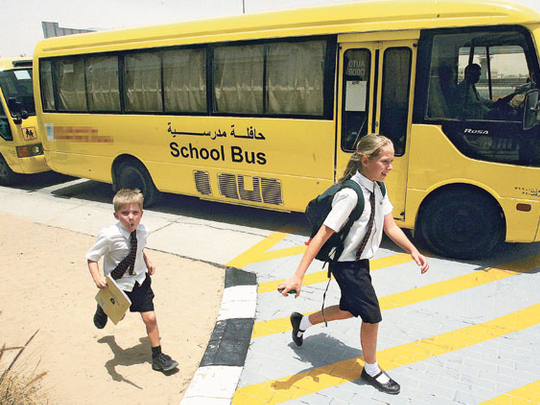
Dubai: All school buses have been instructed to have speed control devices installed beginning this academic year to permit a maximum 80 km/h.
The instruction is part of a series of new safety measures issued by the Roads and Transport Authority (RTA) in Dubai as well as the Emirates Standardisation and Metrology Authority (Esma) federally, which also includes reduction of glass tinting from 50 per cent to 30 per cent.
The speed controller becomes mandatory following a few violations in the last couple years leading to accidents and dangers for the students.
“School buses must not exceed speed 80km/hr,” said Mohammad Abdullah Al Ali, Director of Planning and Business Development at RTA’s Public Transport Agency (PTA) that regulates school transport in Dubai.
“Speed controllers should be fixed to all school buses according to the specifications of Esma.”
All public and private schools reopen for a new academic year from today, although private schools following different curricula began to open from last week. It is though that as many as 136,218 pupils from private schools in Dubai use 4,804 buses that are registered with RTA for school transport.
With the instructions coming into effect this year, school buses across the country will need to have speed controller set at 80km/hr, a reverse alarm, a clearly marked emergency exit, the automatic stop arm, and all seats facing front etc.
Meanwhile, RTA has extended the deadline to have female supervisors on school buses until January 2013 following alleged incidents of child abuse on vehicles last year. RTA issued the instruction earlier but have allowed the extension to provide schools with more time to make arrangements, although many have already done so.
With student becoming an even greater priority for the government, ESMA has also issued regulations that will be implemented federally from this academic year. Though the regulations are more or less similar to those that were already issued and implemented by RTA in Dubai and Abu Dhabi Educational Council in Abu Dhbai, Esma says the rules will unify the safety codes and have a central system of verification.
“We are trying to have common standards,” said Mohammad Saleh Badri, Director General of Esma. “We saw that there are high safety levels in places in Dubai and Abu Dhabi but the other emirates were lagging behind, so we decided to bring them all under a common code,”
According to Badri, the standards and regulations will be issued by Esma and the implementaton will be done with the assistance of local authorities.
Esma has also instructed operators to remove all sharp objects from the buses, which must be no older than 15 years, while also banning the use of mobile phones on the vehicles.
The authorities have left the GPS tracking systems and security cameras optional for schools and operators, despite suggestions from many parents to make it mandatory.
While the Ministry of Education requires its operator to have some of its buses special needs friendly, no authority has made it mandatory yet for private schools.












